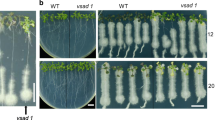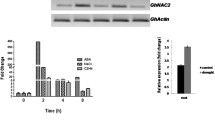Abstract
Key message
Overexpression of GhACL5 , an ACAULIS5 from cotton, in Arabidopsis increased plant height and T-Spm level. Silencing of GhACL5 in cotton exhibited a dwarf phenotype and reduced resistance to Verticillium dahliae.
Abstract
The Arabidopsis thaliana gene ACAULIS5 (ACL5), for which inactivation causes a defect in stem elongation, encodes thermospermine (T-Spm) synthase. However, limited information is available about improvement in plant height by the overexpression of ACL5 gene, and the biological functions of ACL5 genes in response to biotic stress. Here, this study reports that constitutive expression of the cotton ACL5 gene (GhACL5) in Arabidopsis thaliana significantly increased plant height and elevated the level of T-Spm. Silencing of that gene in cotton reduced the amount of T-Spm and led to a severe dwarf phenotype. Expression of GhACL5 was induced upon treatment with the fungal pathogen Verticillium dahliae and plant hormones salicylic acid, jasmonic acid, and ethylene in resistant cotton plants, but gene silencing in cotton enhanced their susceptibility to V. dahliae infection. Furthermore, T-Spm exposure effectively inhibited V. dahliae growth in vitro. In summary, GhACL5 expression is related to in planta levels of T-Spm and is involved in stem elongation and defense responses against V. dahliae.








Similar content being viewed by others
Abbreviations
- ACL5 :
-
ACAULIS5
- Arg:
-
Arginine
- ET:
-
Ethephon solution
- GA:
-
Gibberellic acid
- hpi:
-
Hours post-inoculation
- HPLC:
-
High-performance liquid chromatography
- JA:
-
Jasmonic acid
- Orn:
-
Ornithine
- PAs:
-
Polyamines
- Put:
-
Putrescine
- SA:
-
Salicylic acid
- SAM:
-
S-Adenosylmethionine
- SAMDC:
-
S-Adenosylmethionine decarboxylase
- Spd:
-
Spermidine
- Spm:
-
Spermine
- SPMS:
-
Spm synthase
- SSH:
-
Suppression subtractive hybridization
- TRV:
-
Tobacco rattle virus
- T-Spm:
-
Thermospermine
- V. dahliae :
-
Verticillium dahliae
- VIGS:
-
Virus-induced gene silencing
- WT:
-
Wild-type
References
Akamatsu T, Hanzawa Y, Ohtake Y, Takahashi T, Nishitani K, Komeda Y (1999) Expression of endoxyloglucan transferase genes in acaulis mutants of Arabidopsis. Plant Physiol 121:715–722
Clay NK, Nelson T (2005) Arabidopsis thickvein mutation affects vein thickness and organ vascularization, and resides in a provascular cell-specific spermine synthase involved in vein definition and in polar auxin transport. Plant Physiol 138:767–777
Clough SJ, Bent AF (1998) Floral dip: a simplified method for Agrobacterium-mediated transformation of Arabidopsis thaliana. Plant J 16:735–743
Dung JK, Hamm PB, Eggers JE, Johnson DA (2013) Incidence and impact of Verticillium dahliae in soil associated with certified potato seed lots. Phytopathology 103:55–63
Gao X, Wheeler T, Li Z, Kenerley CM, He P, Shan L (2011) Silencing GhNDR1 and GhMKK2 compromises cotton resistance to Verticillium wilt. Plant J 66:293–305
Gonzalez ME, Marco F, Minguet EG, Carrasco-Sorli P, Blázquez MA, Carbonell J, Ruiz OA, Pieckenstain FL (2011) Perturbation of spermine synthase gene expression and transcript profiling provide new insights on the role of the tetraamine spermine in Arabidopsis defense against Pseudomonas viridiflava. Plant Physiol 156:2266–2277
Hanzawa Y, Takahashi T, Michael AJ, Burtin D, Long D, Pineiro M, Coupland G, Komeda Y (2000) ACAULIS5, an Arabidopsis gene required for stem elongation, encodes a spermine synthase. EMBO J 19:4248–4256
Imai A, Akiyama T, Kato T, Sato S, Tabata S, Yamamoto KT, Takahashi T (2004) Spermine is not essential for survival of Arabidopsis. FEBS Lett 556:148–152
Imai A, Hanzawa Y, Komura M, Yamamoto KT, Komeda Y, Takahashi T (2006) The dwarf phenotype of the Arabidopsis acl5 mutant is suppressed by a mutation in an upstream ORF of a bHLH gene. Development 133:3575–3585
Imai A, Komura M, Kawano E, Kuwashiro Y, Takahashi T (2008) A semi-dominant mutation in the ribosomal protein L10 gene suppresses the dwarf phenotype of the acl5 mutant in Arabidopsis thaliana. Plant J 56:881–890
Kakehi J, Kuwashiro Y, Niitsu M, Takahashi T (2008) Thermospermine is required for stem elongation in Arabidopsis thaliana. Plant Cell Physiol 49:1342–1349
Kakehi J, Kuwashiro Y, Motose H, Igarashi K, Takahashi T (2010) Norspermine substitutes for thermospermine in the control of stem elongation in Arabidopsis thaliana. FEBS Lett 584:3042–3046
Kakehi J, Kawano E, Yoshimoto K, Cai Q, Imai A, Takahashi T (2015) Mutations in ribosomal proteins, RPL4 and RACK1, suppress the phenotype of a thermospermine-deficient mutant of Arabidopsis thaliana. PLoS One 10(1):e0117309
Kim NH, Kim BS, Hwang BK (2013) Pepper arginine decarboxylase is required for polyamine and γ-aminobutyric acid signaling in cell death and defense response. Plant Physiol 162:2067–2083
Kim DW, Watanabe K, Murayama C, Izawa S, Niitsu M, Michael AJ, Berberich T, Kusano T (2014) Polyamine oxidase5 regulates Arabidopsis growth through thermospermine oxidase activity. Plant Physiol 165:1575–1590
Knott JM, Römer P, Sumper M (2007) Putative spermine synthases from Thalassiosira pseudonana and Arabidopsis thaliana synthesize thermospermine rather than spermine. FEBS Lett 581:3081–3086
Livak KJ, Schmittgen TD (2001) Analysis of relative gene expression data using real-time quantitative PCR and the 2(−Delta C(T)) method. Methods 25:402–408
Luo J, Fuell C, Parr A, Hill L, Bailey P, Elliott K, Fairhurst SA, Martin C, Michael AJ (2009) A novel polyamine acyltransferase responsible for the accumulation of spermidine conjugates in Arabidopsis seed. Plant Cell 21:318–333
Mandal S, Mandal A, Johansson HE, Orjalo AV, Park MH (2013) Depletion of cellular polyamines, spermidine and spermine, causes a total arrest in translation and growth in mammalian cells. Proc Natl Acad Sci USA 110:2169–2174
Marina M, Sirera FV, Rambla JL, Gonzalez ME, Blázquez MA, Carbonell J, Pieckenstain FL, Ruiz OA (2013) Thermospermine catabolism increases Arabidopsis thaliana resistance to Pseudomonas viridiflava. J Exp Bot 64:1393–1402
Muñiz L, Minguet EG, Singh SK, Pesquet E, Vera-Sirera F, Moreau-Courtois CL, Carbonell J, Blázquez MA, Tuominen H (2008) ACAULIS5 controls Arabidopsis xylem specification through the prevention of premature cell death. Development 135:2573–2582
Nambeesan S, Abu Qamar S, Laluk K, Mattoo AK, Mickelbart MV, Ferruzzi MG, Mengiste T, Handa AK (2012) Polyamines attenuate ethylene-mediated defense responses to abrogate resistance to Botrytis cinerea in tomato. Plant Physiol 158:1034–1045
Oshima T (1979) A new polyamine, thermospermine, 1,12-diamino-4,8-diazadodecane, from an extreme thermophile. J Biol Chem 254:8720–8722
Wu LZ, Wang XF, Zhang Y, Li XH, Zhang GY, Wu LQ, Li ZK, Ma ZY (2014) Function of acid insoluble lignin and GhLaccase in cotton resistance to Verticillium wilt. Acta Agron Sin 40:1157–1163
Xu F, Yang L, Zhang J, Guo X, Zhang X, Li G (2012) Prevalence of the defoliating pathotype of Verticillium dahliae on cotton in central China and virulence on selected cotton cultivars. J Phytopathol 160:369–376
Zhang CY, Wang XF, Zhang GY, Wu LQ, Chi JN, Li ZK, Ma ZY (2010) ESTs analysis of suppression subtractive hybridization library from upland cotton resistant cultivar infected by Verticillium dahliae. Cotton Sci 22:17–22
Zhang Y, Wang XF, Yang S, Chi JN, Zhang GY, Ma ZY (2011) Cloning and characterization of a Verticillium wilt resistance gene from Gossypium barbadense and functional analysis in Arabidopsis thaliana. Plant Cell Rep 30:2085–2096
Zhang Y, Wang XF, Ding ZG, Ma Q, Zhang GR, Zhang SL, Li ZK, Wu LQ, Zhang GY, Ma ZY (2013) Transcriptome profiling of Gossypium barbadense inoculated with Verticillium dahliae provides a resource for cotton improvement. BMC Genom 14:637
Acknowledgments
This work was supported by the 863 Project of China (No. 2013AA102601-5) and the Science & Technology Pillar Program of Hebei Province (14226308D). We are grateful to Priscilla Licht for critical reading of the manuscript. We thank Yule Liu of Tsinghua University for kindly offering the TRV vector, and Sun Yan-xiang of Langfang Normal University for kindly offering the pGN vector.
Author information
Authors and Affiliations
Corresponding author
Ethics declarations
Conflict of interest
The authors declare that they have no conflict of interest.
Additional information
Communicated by P. Lakshmanan.
Rights and permissions
About this article
Cite this article
Mo, H., Wang, X., Zhang, Y. et al. Cotton ACAULIS5 is involved in stem elongation and the plant defense response to Verticillium dahliae through thermospermine alteration. Plant Cell Rep 34, 1975–1985 (2015). https://doi.org/10.1007/s00299-015-1844-3
Received:
Revised:
Accepted:
Published:
Issue Date:
DOI: https://doi.org/10.1007/s00299-015-1844-3




